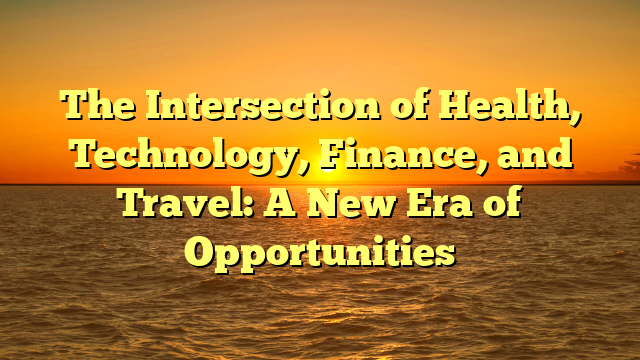
In the modern world, advancements in health, technology, finance, and travel have led to new opportunities for individuals to improve their lives and businesses to innovate in various sectors. These areas are increasingly interconnected, offering unprecedented access to services and tools that were once unimaginable. As technology continues to evolve, it significantly influences how people approach their health, manage their finances, and explore the world. This piece examines how these domains intertwine to create a better future for everyone.
The Role of Technology in Health
Maintaining good health is a universal concern, but now, thanks to technological advancements , healthcare has reached new levels of accessibility and personalization. Digital health tools, like telemedicine, wearable devices, and mobile health apps, have transformed the way people monitor their well-being.
One of the key advancements is telemedicine, which has transformed in how patients access medical professionals. Rather than waiting for an appointment or visiting a clinic, people can now have consultations from the comfort of their homes. This development has proven especially beneficial in remote areas where healthcare access is limited. Moreover, it allows patients to save time and money by eliminating the need for travel.
Wearable health devices have made it easier for individuals to monitor their health on a daily basis. These devices track heart rate, sleep patterns, physical activity, and even blood oxygen levels. They provide real-time feedback, which helps users make informed decisions about their health and fitness. Such devices are not just for fitness enthusiasts .
In addition, mobile health apps help individuals manage their chronic conditions, schedule doctor’s visits, and even get reminders for medication. These apps also allow people to access a wealth of information related to health, from the latest research findings to personalized diet plans. With this level of convenience is transforming how people take care of their health, putting them in control like never before.
The Financial Impact of Technology
The financial world has been equally transformed by technology . The integration of artificial intelligence (AI), machine learning, blockchain, and mobile applications has streamlined operations and provided more transparency and accessibility.
AI-powered tools have made it easier for investors to analyze trends and make informed decisions. Robo-advisors, for example, offer personalized financial advice without the need for human financial advisors. These systems use algorithms to analyze a person’s financial situation and recommend tailored investment strategies.
Moreover, mobile apps and digital wallets have simplified banking and investing. With platforms like PayPal, Venmo, and various mobile banking apps, individuals can manage their finances on the go. Transferring funds on mobile platforms has enabled financial inclusivity for millions, especially in developing countries.
Cryptocurrencies and blockchain have disrupted traditional financial systems. Cryptocurrencies, like Bitcoin and Ethereum, are increasingly being used for transactions, offering a decentralized method of transferring value. Blockchain, which powers these digital currencies, has the potential to improve transparency and reduce fraud in a wide range of industries, from banking to real estate.
For businesses, technology has made financial management more efficient. Cloud-based tools for accounting, payroll, and budgeting have eliminated much of the manual work that used to be time-consuming. These tools help businesses reduce operational costs, improve financial forecasting, and ensure compliance with regulations.
The Evolution of Travel with Technology
Technology has made travel easier, more efficient, and more enjoyable . In the past, booking a flight or hotel required calling travel agents or navigating complex websites. Now, people can book trips through user-friendly apps in just a few clicks.
With services like Airbnb and Booking.com, travelers can book everything they need from accommodation to activities in a matter of minutes. This democratization of travel has enabled individuals from all walks of life to explore the world, regardless of their budget.
Moreover, technology has made traveling more seamless. Smart luggage, which can be tracked with GPS, ensures that passengers never lose their belongings again. Apps like Google Maps and Waze help travelers navigate unfamiliar areas with ease, providing real-time traffic updates and directions. The rise of these tech-driven tools , getting lost or struggling with directions has become a thing of the past.
Another exciting trend in travel is the use of virtual and augmented reality (VR and AR). These technologies are being used in the tourism industry to create immersive experiences. For instance, museums and historical sites are using VR to give visitors an interactive tour. Similarly, AR apps can help travelers learn more about their surroundings by providing real-time information about landmarks, restaurants, and cultural sites.
Moreover, the rise of electric vehicles (EVs) and sustainable travel options is another example of how technology is influencing travel. Eco-friendly transport options, like electric cars and bikes, are helping to reduce the carbon footprint of travel, making it more sustainable.
The Intersection of Health, Technology, Finance, and Travel
When we combine these sectors, we can see how they mutually benefit from each other. For instance, technology allows individuals to take care of their health while traveling . For instance, a health-conscious individual traveling to a different country can use a fitness tracker to ensure they are staying active, while also using a financial app to keep track of their spending.
Slot have made it simpler for individuals to support the growing health tech industry. As the health and wellness industry expands, technology plays a key role in connecting investors to the latest innovations. Moreover, travel services can help people access healthcare worldwide, offering services like international health insurance and telemedicine during their trips.
Conclusion
As we move further into the digital age, the convergence of health, technology, finance, and travel will continue to shape our daily lives. The future of these industries promises even greater integration, making life more convenient and accessible for all. By harnessing the power of technology, we can look forward to a world where our health, wealth, and travel experiences are all optimized and interconnected in ways we never thought possible.





